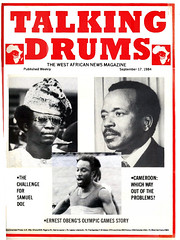Music And Arts Scene
African Records Review
By Kwabena Asamoah
ORQUESTRA CARAVELA: 'Amour Sans Frontieres' (COCODEAL CCD 115) 'Mbongo' 'Aquela Tarde'/ 'Trahison' 'Amor Sem Fronteiras",
One of Angola's most popular groups, Orquestra Caravela invades the British scene for the first time with this debut album which identifies some of the aspects of the Angolan pop scene. The bias is more towards Congo music whose influence stretches across Africa especially East and Central parts.These young musicians do not, however, merely try to master the Congo style; they endeavour to be themselves in 'Aquela Tarde' which sounds almost like a ballad. In a measured pulse, the instruments synchronise melodiously while the vocal harmony pours onto the music. The combination of rhythm and lead guitars gives a certain appeal to the song.
'Mbongo' like 'Trahison' and 'Amore Sem Fronteira' are all in the soukous vein but whereas Orquestra Caravela dips into soukous straight from the beginning in 'Mbongo' they start with rhumba beat in the others before working towards the heat of soukous.
What is striking about the group is their perfect and sweet vocal harmony which would sometimes appear to be one of the strongest points of Zairean/ Congolese singers.
'Amor Sem Fronteiras' (endless love) sung in Portuguese deserves to be the title track. The arrangements, orchestration and the vocals sparkle enough to polish the track. The music of Orquestra Caravela is not necessarily as swift as you would normally find in Congo music but the guitars and the vocals endeavour to salvage the otherwise light music.
WEDJI 'BRITO' PED: 'Carte De Visite (VS RECORDS VSP 001LP)
You don't know where to start when you listen to a record which has so much to offer. Wedji 'Brito' Ped from the Ivory Coast, has put together a package on this album which is more likely to intrigue and fascinate many listeners with open mind about music from Africa south of the Sahara.Ped's music is tidy and well- arranged as you will realise right from the first track on the A-side Ato Ayo'. The throbbing bass, handclaps and the percussion accompanied by Ped's magnificent guitar works open the song whose intricate horns arrangements provide an aura of competence. Manu Dibango's Afrovision Production provided some chorus on this track and on 'Djokou'. Is there any wonder, therefore, if Manu Dibango's style creeps into 'Akou (Part 1)"?
Don't forget that Dibango who appears in the picture at the back of the sleeve had been the arranger and music director of the Ivoirian Radio and TV Band (Orchestre de la R.T.I.) a function now exercised by a young Ghanaian pianist (Redcap James) whose debut hi-life instrumentals appear on the market in a month's time. Besides, Dibango had earlier been doing session work in the studio for François Lougan, the late Ernesto Djedje and many other Francophone artistes in the seventies.
'Nina' which is dedicated to young Ivorians who adored the Pop wave of the seventies sees the ubiquitous Moussa Bamba Yang display on the synthesizer. Of course, the chorus too sounds great. 'Djokou' would have been an appropriate dedication because smootchers too were in vogue at that time.
What would not elude the keen listener is Wedji Ped's standard of guitar playing, especially in 'Ato Ayo' Gamanalibo' and 'Djokou'. Exploring a typical Ivorian rhythm in 'Gamanalibo', Ped also picks arrangements from other sources to arrive at a moving and interesting music.
Like most young Ivorian musicians, Ped dedicates his Ziglibithy song - 'Doussi' - to the high priest of Ziglibithy music - the late Ernesto Djedje. Bamb Yang's manipulation of the synthesizer is superb and the chorus at the tail end of the song sounds excellent.
On balance, the costume in the picture on the front cover of the album may not fit the music played but it will not come as a surprise to the listener that Wedji Brito' Ped is a great guitarist, singer and arranger of a particular class whose music has a lot of promise for melodic content. It is difficult to choose the main buzz but I would not miss this album.
HAPPENINGS
MAAS course
The Minorities' Arts Advisory Service (MAAS) will organise a four-day course from October 15-16 and October 22-23 at Management School, Polytechnic of Central London, Marylebone Road, London NW1.The first of these courses, entitled Appraising a programme of work and fundraising', is designed to familiarise participants with the processes necessary to conduct a feasibility study for an arts project and to develop the skill and knowledge to successfully fund it.
For further information on the above course and other courses to be run by MAAS contact: The Training Officer, MAAS, Beauchamp Lodge, 2 Warwick Crescent, London W2 6NE.
Namibian cultural festival
This year marks 100 years of struggle of the Namibian people against colonial domination and to mark the occasion the Namibia Support Committee is organising the Namibian Cultural Festival which was scheduled to open on September 12-15 at the Commonwealth Institute.The show, which will run till September 170, includes a national tour which will take it through some of the major cities of the country.
Out of the dynamic history of resistance, a powerful culture has been born. Black Namibians have turned their back on the shabby system of 'Bantu education' and the lack of cultural amenities and drawn, instead on their own remarkable history, both pre-colonial and recent, to provide themselves and the world with an en- during treasure house of music, song, dance and plays. These will be reflected in the cultural festival.
